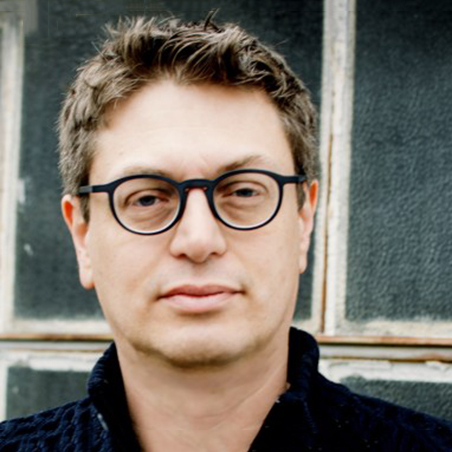Dorian Stuber
Isabelle Peregrin Odyssey Associate Professor of English, Hendrix College, Arkansas
Bachelor of Arts (Hons), Contemporary Studies and English, 1997
In a paradoxical and perverse way, Holocaust literature is very beautiful and affirming.
Dorian Stuber has a corner office with two, count them, two windows looking out onto the campus of Hendrix College in Conway, Arkansas. There are books everywhere, but he says, “it’s controlled chaos.”
Hendrix is a private liberal arts college, oriented towards social justice. It’s like King’s in many ways, Dorian says, particularly in his classroom.
“I have a Socratic style,” he explains. “It’s discussion based. I rarely lecture. I try to get the students to talk to each other and not just to me. I’m trying to create a kind of intellectual community in the classroom. I learned that from King’s. It was a formative place for me. No question.”
Dorian came to King’s after a gap year that turned into three. He was a book seller and doing a little freelance writing, but he wanted something that offered an intellectual challenge.
“That’s when I discovered the Foundation Year Program (FYP) and it sounded amazing. Then I got there, and King’s got its hooks into me. I continued in the Contemporary Studies Program (CSP). It was exciting and I kept at it.”
One of the courses he took introduced him to Holocaust literature—diaries, letters and memoirs—and it struck a chord. When he did his Master’s at Western University he focused on trauma—not about the Holocaust he says, “but it was in the background.”
Dorian then went to Cornell for his PhD before landing the job at Hendrix.
“When I got to Hendrix, they asked me what I wanted to teach. They were open to me teaching a Holocaust literature class. In fact, there was huge interest in it. I was able to develop it on the job. That’s the value of a small liberal arts college.”
Dorian’s interest in the literature does not come from his heritage. His family is Swiss, but he did convert to Judaism. His interest in it is both intellectual and emotional.
“In a paradoxical and perverse way, Holocaust literature is very beautiful and affirming. We can look at these texts as acts of resistance. Whether we are talking about diaries created at the time, letters, fragments, or whether we are talking about works created after like memoirs and novels, they are, as I said, acts of resistance and I find them enlivening.”
As he teaches a memoir such as Survival at Auschwitz by Primo Levi or the Pulitzer prize winning graphic novel Maus by Art Spiegelman he talks to his students about morality.
“I find that there seems to be a sort of moral clarity to the Holocaust in the beginning—there are good guys and bad guys—then as you get into it, it becomes more complex than that. That is what I try to bring to my students.”
Dorian also writes and publishes literary reviews and essays, some about the Holocaust, but others not. You can read some of his work at his blog, www.eigermonchjungfrau.wordpress.com
“I have become really, and I got this from King’s, really committed to public scholarship—trying to write things that intelligent, non-specialist audiences would be interested in.”
It is he says, the perfect outlet for his thoughts.
“I love reading. I love teaching. This kind of sharing of ideas is a chance to connect with my people.”
 Connect with Dorian Stuber
Connect with Dorian Stuber